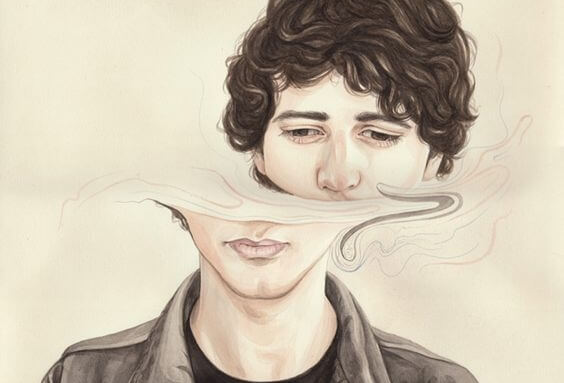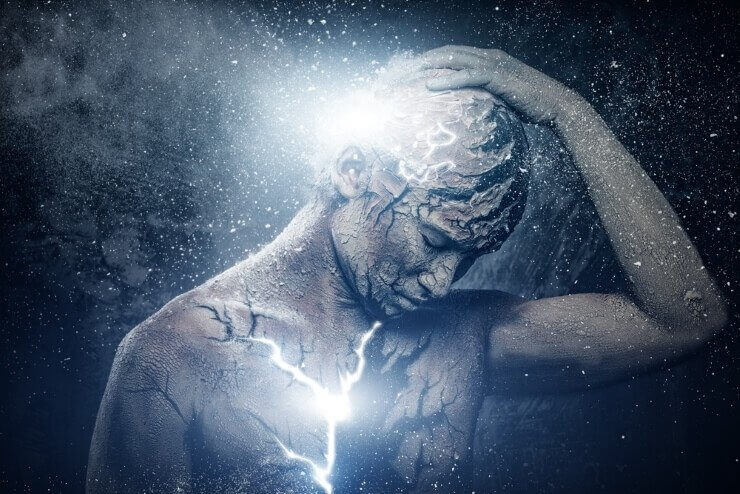Dissociation: a Fascinating Phenomenon of the Mind

Dissociation is a phenomenon referring to the disconnection some people have between their thoughts, emotions, memories, and even their own identities.
For example, you would experience a small degree of dissociation if you get so immersed in a movie or conversation that you don’t notice most of what’s going on around you.
Some people experience a more severe degree of dissociation. These people don’t know if what they are living is real or not. Other examples of severe cases would be people with multiple personality disorder or dissociative identity disorder.
This type of phenomena is common in people who have suffered different kinds of psychological trauma. This ranges from sexual abuse to psychological or physical violence.
We may all experiment symptoms of alienation and disconnection from reality at some point. The point here is whether these symptoms interfere with our daily lives. And also, how much these symptoms do interfere.
Understanding the different levels of dissociation will be key. It will be especially important in knowing if you need to get professional help. In any case, if you have any suspicions or questions, get help.
Dissociation is a lack of emotional connection
Some psychologists define dissociation as a defense mechanism of the subconscious mind. We set the mechanism into motion in order to avoid experiencing emotional pain. This is especially true when we’re in conflict or a stressful situation.
The problem is when this dissociation lasts over time even though the traumatic event has already ended.
Let’s say a boy was involved in a very serious car accident. As a way to protect himself, his memory has frozen that memory. When he remembers the accident he doesn’t experience any kind of emotion.

It is a state of psychological disturbance found in many psychological disorders. These include post-traumatic stress disorder, anxiety, depression, borderline personality disorder and dissociative disorders, among others.
One of the main characteristics of dissociation is that it can alter one’s state of consciousness, memory and the way one perceives their surroundings. In more serious cases, even your identity can be affected.
Common symptoms of the phenomenon of dissociation
In dissociative disorders, there are some common symptoms, though they don’t have to all be present at the same time. Normally one’s attention levels are altered. There may be disorientation in time and space and the individual’s behavior is usually automatic. For example, driving, reading, or other things we know how to do without thinking.
In addition to this, the person may not remember what happened just a few minutes ago. This implies problems creating new memories.
Depersonalization
Depersonalization is a phenomenon that happens when the person doesn’t recognize himself in his own body or mind. There is a sense of detachment and the person lives as if he were an external observer of himself.
For example, they may look in the mirror and not recognize themselves. In fact, they may even not feel a connection with their own body.
Derealization
The individual experiences the world as if it were not real or as if it were a dream. This person feels confused because he has a hard time distinguishing if things are really happening. He perceives the world in a distorted and distant way without being able to stop it. For example, he may hear the voices of others as distant or far away.
Dissociative amnesia
Amnesia is the inability to remember relevant autobiographical information. It may be that the person forgets his own birthday, the date of his wedding, or even whole parts of his life.
Disassociative amnesia is different from normal forgetfulness because it affects one’s life. A person with this particular type of amnesia feels uncomfortable with it.
Confusion and disturbance of one’s identity
Identity confusion occurs when the individual has doubts about who he really is. The person may experience a distortion involving time, space, and the situation.
For example, the person may think he is ten years younger than he actually is. When a person experiences an identity alteration, they may change their tone of voice or use different facial expressions. These behaviors may be related to situations in the past.

Why does dissociation occur?
A slight degree of dissociation, like being so absorbed in your thoughts that you end up at your destination without really remembering driving there, is normal sometimes. This dissociation, for example, doesn’t have to be pathological. It becomes pathological when it causes serious discomfort.
When we talk about more severe levels of dissociation, there are several possible causes. Researchers explain this phenomenon as a combination of both environmental and biological factors.
Dissociation is an adaptive mechanism in order to disconnect from the emotional pain caused by a trauma.
Traumatic events such as child abuse, rape, and repeated physical punishment during childhood, among others, are usually the origin. Children in these situations use dissociation as an adaptive mechanism to reduce the emotional pain they’re experiencing.
However, when dissociation persists in adulthood and the initial danger no longer exists, it may end up being pathological. The adult may become disconnected from any situation he perceives as a potential threat. This would make him experience life distant from reality.
What should you do if you see yourself in any of these symptoms?
First of all, don’t worry. Realizing you weren’t listening to what your significant other was telling you or that you don’t remember your subway ride doesn’t necessarily mean you need psychological treatment.
On the other hand, you may need to seek psychological help if the symptoms are more frequent or interfere with your daily life.
When there are symptoms of depersonalization, derealization, dissociative amnesia, or confusion and disturbance of the identity, psychological treatment will be necessary to help you bring the disassociated parts back together again.

For this, therapy will teach you how to regulate your emotions better. You should incorporate relaxation mechanisms when these emotions threaten to overflow.
Usually, specialists give personalized treatment. In this treatment, the initial trauma is dealt with and the dissociated parts are worked on. Self-care strategies and new resources are taught so that you can begin to lead a more stable and healthy life.
It’s all about restoring your confidence in your own abilities as a healthy form of protection and self-care.
Dissociation is a phenomenon referring to the disconnection some people have between their thoughts, emotions, memories, and even their own identities.
For example, you would experience a small degree of dissociation if you get so immersed in a movie or conversation that you don’t notice most of what’s going on around you.
Some people experience a more severe degree of dissociation. These people don’t know if what they are living is real or not. Other examples of severe cases would be people with multiple personality disorder or dissociative identity disorder.
This type of phenomena is common in people who have suffered different kinds of psychological trauma. This ranges from sexual abuse to psychological or physical violence.
We may all experiment symptoms of alienation and disconnection from reality at some point. The point here is whether these symptoms interfere with our daily lives. And also, how much these symptoms do interfere.
Understanding the different levels of dissociation will be key. It will be especially important in knowing if you need to get professional help. In any case, if you have any suspicions or questions, get help.
Dissociation is a lack of emotional connection
Some psychologists define dissociation as a defense mechanism of the subconscious mind. We set the mechanism into motion in order to avoid experiencing emotional pain. This is especially true when we’re in conflict or a stressful situation.
The problem is when this dissociation lasts over time even though the traumatic event has already ended.
Let’s say a boy was involved in a very serious car accident. As a way to protect himself, his memory has frozen that memory. When he remembers the accident he doesn’t experience any kind of emotion.

It is a state of psychological disturbance found in many psychological disorders. These include post-traumatic stress disorder, anxiety, depression, borderline personality disorder and dissociative disorders, among others.
One of the main characteristics of dissociation is that it can alter one’s state of consciousness, memory and the way one perceives their surroundings. In more serious cases, even your identity can be affected.
Common symptoms of the phenomenon of dissociation
In dissociative disorders, there are some common symptoms, though they don’t have to all be present at the same time. Normally one’s attention levels are altered. There may be disorientation in time and space and the individual’s behavior is usually automatic. For example, driving, reading, or other things we know how to do without thinking.
In addition to this, the person may not remember what happened just a few minutes ago. This implies problems creating new memories.
Depersonalization
Depersonalization is a phenomenon that happens when the person doesn’t recognize himself in his own body or mind. There is a sense of detachment and the person lives as if he were an external observer of himself.
For example, they may look in the mirror and not recognize themselves. In fact, they may even not feel a connection with their own body.
Derealization
The individual experiences the world as if it were not real or as if it were a dream. This person feels confused because he has a hard time distinguishing if things are really happening. He perceives the world in a distorted and distant way without being able to stop it. For example, he may hear the voices of others as distant or far away.
Dissociative amnesia
Amnesia is the inability to remember relevant autobiographical information. It may be that the person forgets his own birthday, the date of his wedding, or even whole parts of his life.
Disassociative amnesia is different from normal forgetfulness because it affects one’s life. A person with this particular type of amnesia feels uncomfortable with it.
Confusion and disturbance of one’s identity
Identity confusion occurs when the individual has doubts about who he really is. The person may experience a distortion involving time, space, and the situation.
For example, the person may think he is ten years younger than he actually is. When a person experiences an identity alteration, they may change their tone of voice or use different facial expressions. These behaviors may be related to situations in the past.

Why does dissociation occur?
A slight degree of dissociation, like being so absorbed in your thoughts that you end up at your destination without really remembering driving there, is normal sometimes. This dissociation, for example, doesn’t have to be pathological. It becomes pathological when it causes serious discomfort.
When we talk about more severe levels of dissociation, there are several possible causes. Researchers explain this phenomenon as a combination of both environmental and biological factors.
Dissociation is an adaptive mechanism in order to disconnect from the emotional pain caused by a trauma.
Traumatic events such as child abuse, rape, and repeated physical punishment during childhood, among others, are usually the origin. Children in these situations use dissociation as an adaptive mechanism to reduce the emotional pain they’re experiencing.
However, when dissociation persists in adulthood and the initial danger no longer exists, it may end up being pathological. The adult may become disconnected from any situation he perceives as a potential threat. This would make him experience life distant from reality.
What should you do if you see yourself in any of these symptoms?
First of all, don’t worry. Realizing you weren’t listening to what your significant other was telling you or that you don’t remember your subway ride doesn’t necessarily mean you need psychological treatment.
On the other hand, you may need to seek psychological help if the symptoms are more frequent or interfere with your daily life.
When there are symptoms of depersonalization, derealization, dissociative amnesia, or confusion and disturbance of the identity, psychological treatment will be necessary to help you bring the disassociated parts back together again.

For this, therapy will teach you how to regulate your emotions better. You should incorporate relaxation mechanisms when these emotions threaten to overflow.
Usually, specialists give personalized treatment. In this treatment, the initial trauma is dealt with and the dissociated parts are worked on. Self-care strategies and new resources are taught so that you can begin to lead a more stable and healthy life.
It’s all about restoring your confidence in your own abilities as a healthy form of protection and self-care.
This text is provided for informational purposes only and does not replace consultation with a professional. If in doubt, consult your specialist.







